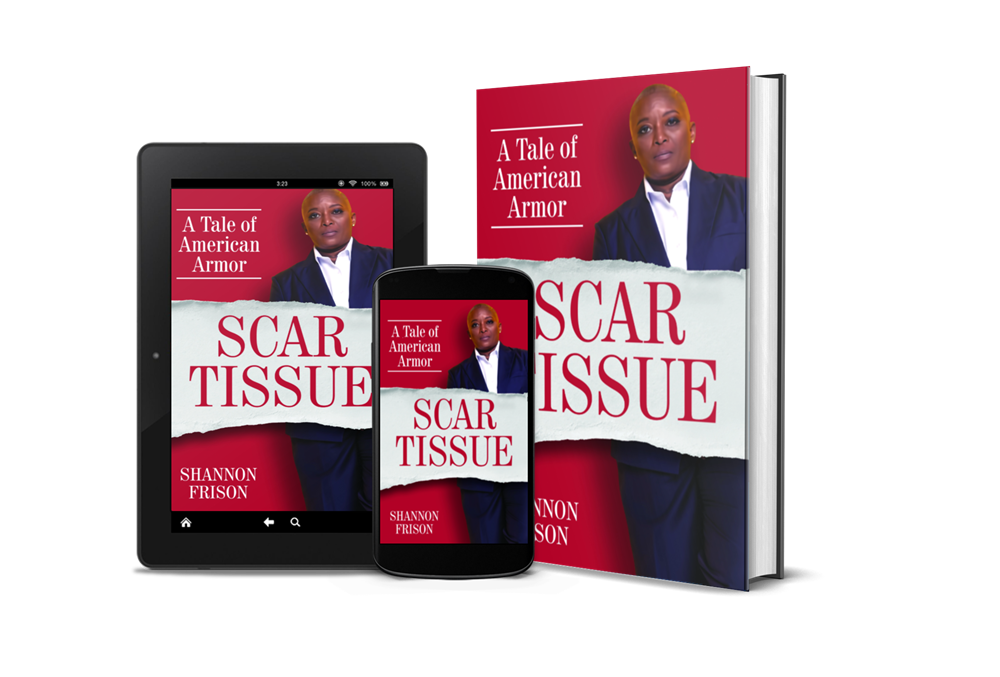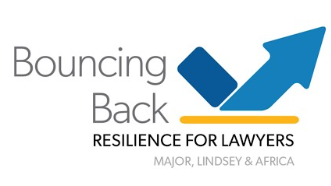
A Tale of American Armor
Scar Tissue
Judge. Marine. Black. Lesbian. Every scar earned. Every lesson lived.
About The Book
Scar Tissue follows the life of Judge Shannon Frison from the South Side of Chicago to the bench of the Massachusetts Superior Court, tracing the path of a Black lesbian Marine who moved through some of America’s most rigid and exclusionary systems—military, legal, and cultural.
The stories she shares are scars: some visible, others buried. At times, they became armor. Over time, they became lessons. Whether facing bias in uniform, judgment in the courtroom, or silence in leadership, Frison had to decide how to carry what the world gave her.
This memoir walks through the moments that left a mark and the mindset that helped her keep going. Scar Tissue is about identity, authority, and navigating power as someone who was never supposed to have it.
Available at These Retailers
review
"But freedom does not mean untouched."
Let me say this right from the start — this book is not polite. It doesn’t whisper its pain or tidy up its rage. Scar Tissue: A Tale of American Armor is a bold, blistering testament — part confession, part autopsy, part hymn — to the ways this country bruises, and to the ways a Black woman refuses to stay broken.
Shannon Frison opens with a courtroom and a storm. “I’d like to know if the tattoos her lawyer has are gang related?” a senior member of an all-white military jury asks. The lawyer is Frison herself — Harvard-educated, Marine-trained, defending a Black woman in Okinawa. In that moment, she writes, “He saw me — Black. He saw my client — Black. He saw her husband — Black… and that is all.”
That “and that is all” echoes through the whole book like a refrain. Frison wields her stories like cross-examination — sharp, precise, and unflinching. She names what our system vehemently denies, what many outright ignore and what some myopicize: racism in the Marines, sexism in the courts, bias masquerading as professionalism, and the ache of being misunderstood even in excellence.
In the introduction, she writes: “Freedom does not mean untouched. We left with wounds we wouldn’t talk about, couldn’t talk about — the kind that leave mangled tissue attached to the muscle and harden over time.” Later she adds, “Life will necessarily scar you. Especially in this country.”
That’s the marrow of this book — how living, particularly as a Black woman in America, comes with its own collection of healed-over injuries. Some visible. Some pulsing under the skin. “The scar tissue that develops at the site of injury,” she explains, “becomes your armor and your teacher.”
And what an education this is. Frison takes us from Mattapan to Okinawa, from Harvard Yard to Marine barracks, from the tender ache of girlhood in Chicago to the cold, fluorescent glare of a courtroom. Her writing is layered — part memoir, part cultural critique, part spiritual reckoning. All truth. It’s as if Audre Lorde had put on combat boots and picked up a gavel.
The language is taut, elegant, and deeply human. When she describes her first taste of bias in uniform, she doesn’t dramatize it — she dissects it: “How dare he mistake me for a gang member… How dare he not even recognize that he was talking to a Marine officer just two ranks below himself.” There’s fire in her restraint.
Midway through the book, she confides, “By the time I put on that black robe, I had already learned what power can and cannot protect you from. I had already been seen, unseen, and mis-seen by every system I served.” That admission — weary and crystalline — reveals the quiet cost of achievement. Frison’s brilliance is in how she keeps turning the mirror: toward the reader, toward the nation, toward herself.
Later, in one of the book’s most searing passages, she reminds us, “We are not broken. We may be battered, bruised, and different — but we are not broken.” And by the final chapter, the tempo slows. The tone deepens. Frison writes, “My armor is softer now. I’ve learned that survival isn’t the same as peace. The scar remains, yes, but I am finally learning to bless it.”
That closing truth ripples back through every page before it — a benediction after battle, a song sung through grit and grace.
This book belongs in the canon of unapologetic Black women truth-tellers — alongside Morrison, Lorde, and hooks. But it also belongs in the hands of anyone who has ever been misjudged, underestimated, or asked to explain their own worthiness.
Frison’s truth is heavy, yes — but it gleams. Her scars, like her words, are luminous with survival.
Because as she reminds us, “The scar is not the ending. It’s the map.”
—Reviewed by Letta Neely
about the author
Retired Justice Shannon Frison is a distinguished legal professional and former judge who served on the Massachusetts Superior Court from 2013 to 2023, making history as the court's youngest appointee at age 39.
Prior to her tenure on the Superior Court, Justice Frison spent over four years on the Boston Municipal Court, where she developed a reputation for her commitment to justice and advocacy for the oppressed.
In 2007, she founded Frison Law Firm, P.C. in Boston, focusing on “blue collar” crime, employment law, and military justice. Her legal career includes high-profile cases in the military courts of North Carolina, Pensacola, and Okinawa, as well as complex criminal trials in Massachusetts, including a notable quadruple murder case in Dorchester.
A Major in the United States Marine Corps and a Marine Corps Judge Advocate, Justice Frison has actively contributed to military justice, serving in various capacities during her two mobilizations in support of the Global War on Terror. She is a passionate educator, having taught law at Brandeis University and Harvard Law School, where she has been a key figure in trial advocacy training.
Justice Frison is a past president of the Massachusetts Black Judges Conference and has been a vocal advocate for diversity, equity, and inclusion within the legal community. She has delivered keynote speeches on bias and diversity and is recognized for her mentorship of law students and trial lawyers.
Now retired from the bench, Justice Frison has returned to Frison Law Firm, P.C., where she continues to focus on complex criminal and civil litigation. She is an active speaker and board member for various organizations, including The Life After Prison, Inc., and remains dedicated to addressing racial disparities in the criminal justice system.

Media & Partner Highlights






.png?width=500&height=250&name=books%20a%20million%20(2).png)


